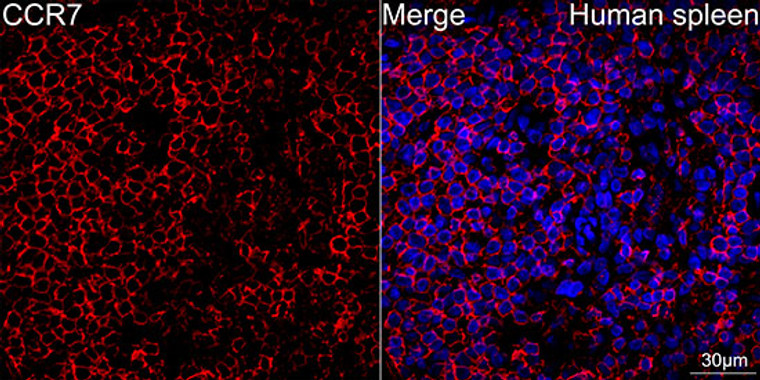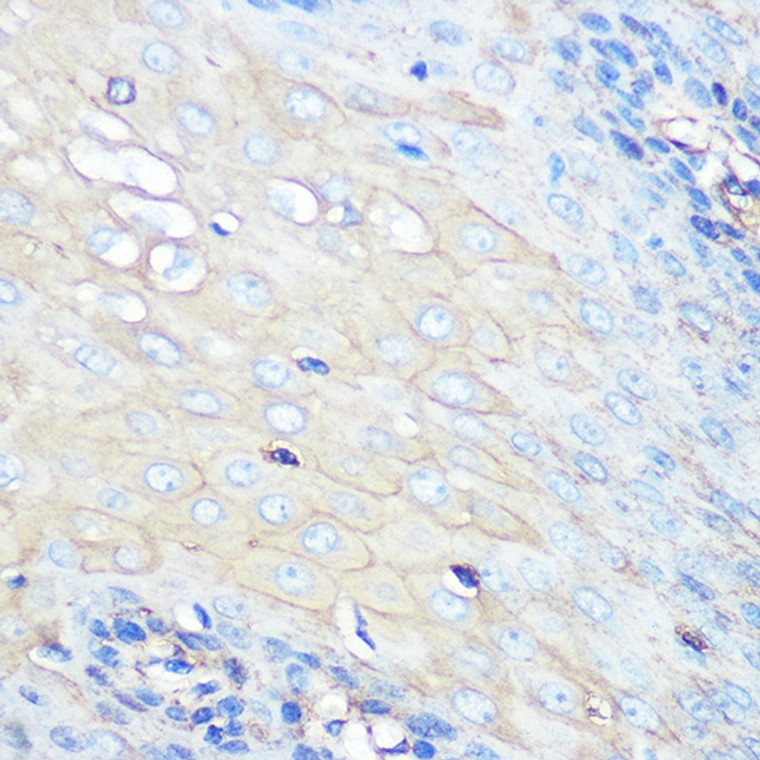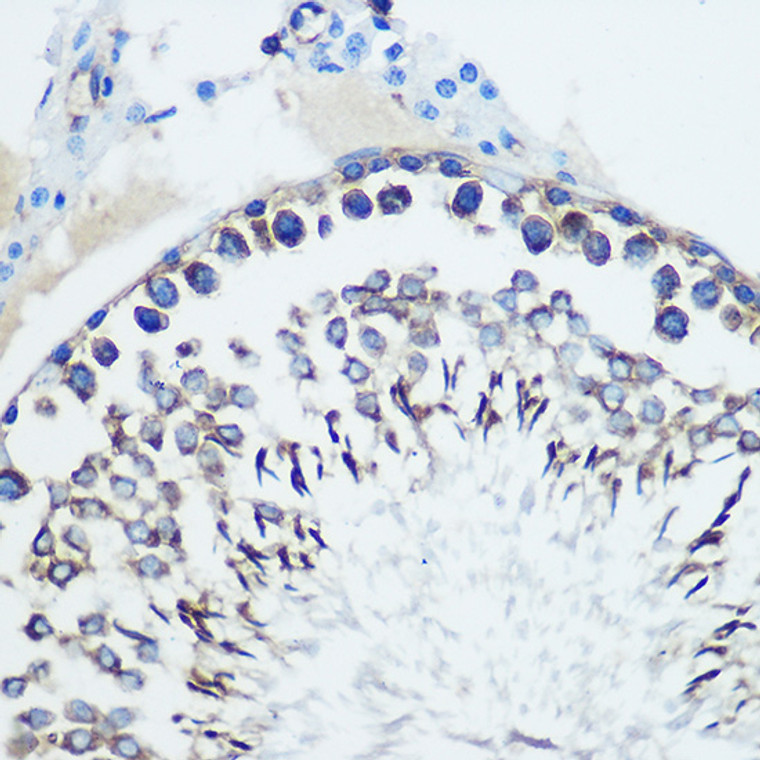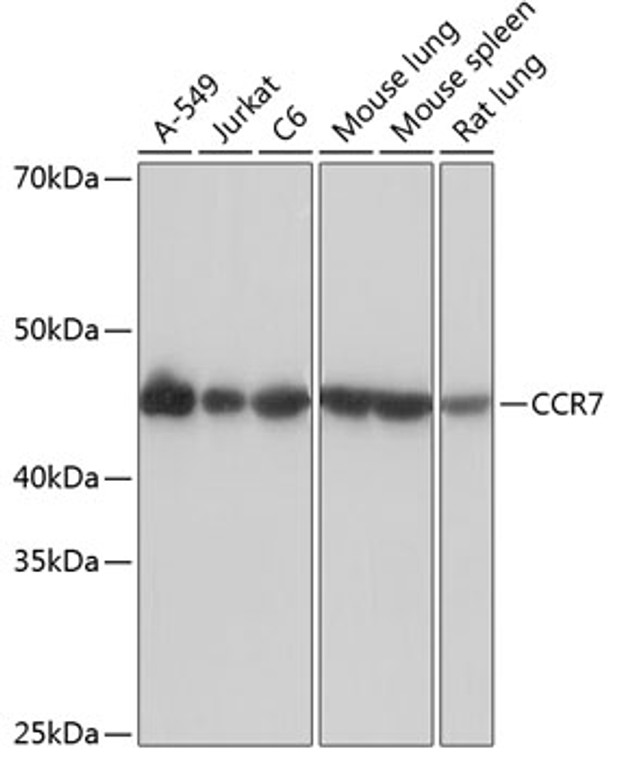| Host: |
Rabbit |
| Applications: |
WB/IHC/IF |
| Reactivity: |
Human/Mouse/Rat |
| Note: |
STRICTLY FOR FURTHER SCIENTIFIC RESEARCH USE ONLY (RUO). MUST NOT TO BE USED IN DIAGNOSTIC OR THERAPEUTIC APPLICATIONS. |
| Short Description: |
Rabbit monoclonal antibody anti-CCR7 (1-100) is suitable for use in Western Blot, Immunohistochemistry and Immunofluorescence research applications. |
| Clonality: |
Monoclonal |
| Clone ID: |
S8MR |
| Conjugation: |
Unconjugated |
| Isotype: |
IgG |
| Formulation: |
PBS with 0.02% Sodium Azide, 0.05% BSA, 50% Glycerol, pH7.3. |
| Purification: |
Affinity purification |
| Dilution Range: |
WB 1:500-1:1000IHC-P 1:50-1:200IF/ICC 1:50-1:200 |
| Storage Instruction: |
Store at-20°C for up to 1 year from the date of receipt, and avoid repeat freeze-thaw cycles. |
| Gene Symbol: |
CCR7 |
| Gene ID: |
1236 |
| Uniprot ID: |
CCR7_HUMAN |
| Immunogen Region: |
1-100 |
| Immunogen: |
A synthetic peptide corresponding to a sequence within amino acids 1-100 of human CCR7 (P32248). |
| Immunogen Sequence: |
MDLGKPMKSVLVVALLVIFQ VCLCQDEVTDDYIGDNTTVD YTLFESLCSKKDVRNFKAWF LPIMYSIICFVGLLGNGLVV LTYIYFKRLKTMTDTYLLNL |
| Tissue Specificity | Expressed in various lymphoid tissues and activated B- and T-lymphocytes, strongly up-regulated in B-cells infected with Epstein-Barr virus and T-cells infected with herpesvirus 6 or 7. |
| Function | Receptor for the MIP-3-beta chemokine. Probable mediator of EBV effects on B-lymphocytes or of normal lymphocyte functions. |
| Protein Name | C-C Chemokine Receptor Type 7C-C Ckr-7Cc-Ckr-7Ccr-7Blr2Cdw197Epstein-Barr Virus-Induced G-Protein Coupled Receptor 1Ebi1Ebv-Induced G-Protein Coupled Receptor 1Mip-3 Beta ReceptorCd Antigen Cd197 |
| Database Links | Reactome: R-HSA-380108Reactome: R-HSA-418594 |
| Cellular Localisation | Cell MembraneMulti-Pass Membrane Protein |
| Alternative Antibody Names | Anti-C-C Chemokine Receptor Type 7 antibodyAnti-C-C Ckr-7 antibodyAnti-Cc-Ckr-7 antibodyAnti-Ccr-7 antibodyAnti-Blr2 antibodyAnti-Cdw197 antibodyAnti-Epstein-Barr Virus-Induced G-Protein Coupled Receptor 1 antibodyAnti-Ebi1 antibodyAnti-Ebv-Induced G-Protein Coupled Receptor 1 antibodyAnti-Mip-3 Beta Receptor antibodyAnti-Cd Antigen Cd197 antibodyAnti-CCR7 antibodyAnti-CMKBR7 antibodyAnti-EBI1 antibodyAnti-EVI1 antibody |
Information sourced from Uniprot.org
12 months for antibodies. 6 months for ELISA Kits. Please see website T&Cs for further guidance









![Immunoprecipitation analysis of 600 Mu g extracts of 293T cells using 3 Mu g [KD Validated] CDX2 Rabbit monoclonal antibody (STJ11101568). Western blot was performed from the immunoprecipitate using CDX2 antibody (STJ11101568) at a dilution of 1:500. Immunoprecipitation analysis of 600 Mu g extracts of 293T cells using 3 Mu g [KD Validated] CDX2 Rabbit monoclonal antibody (STJ11101568). Western blot was performed from the immunoprecipitate using CDX2 antibody (STJ11101568) at a dilution of 1:500.](https://cdn11.bigcommerce.com/s-zso2xnchw9/images/stencil/300x300/products/90481/359933/STJ11101568_1__84936.1713124490.jpg?c=1)
